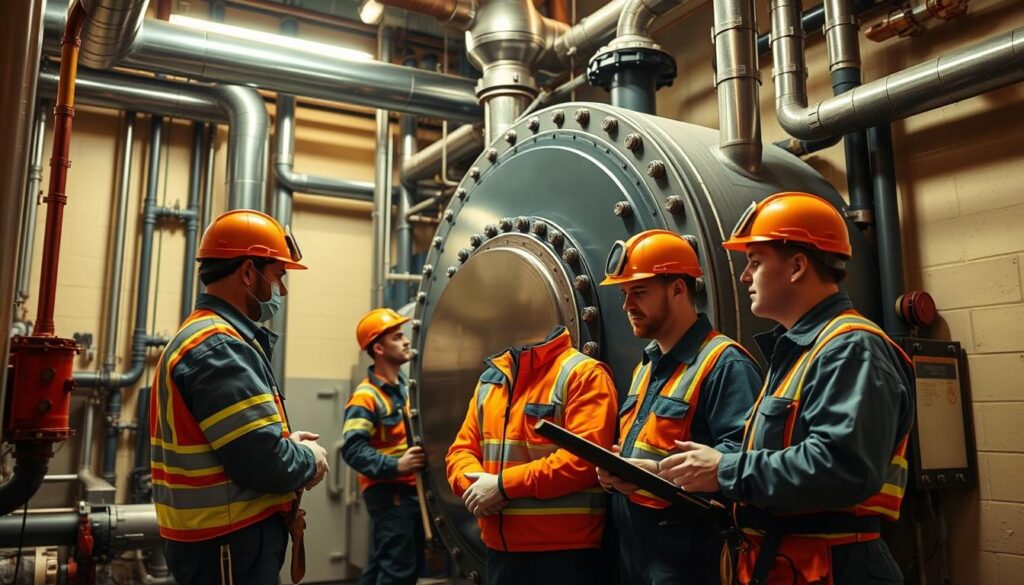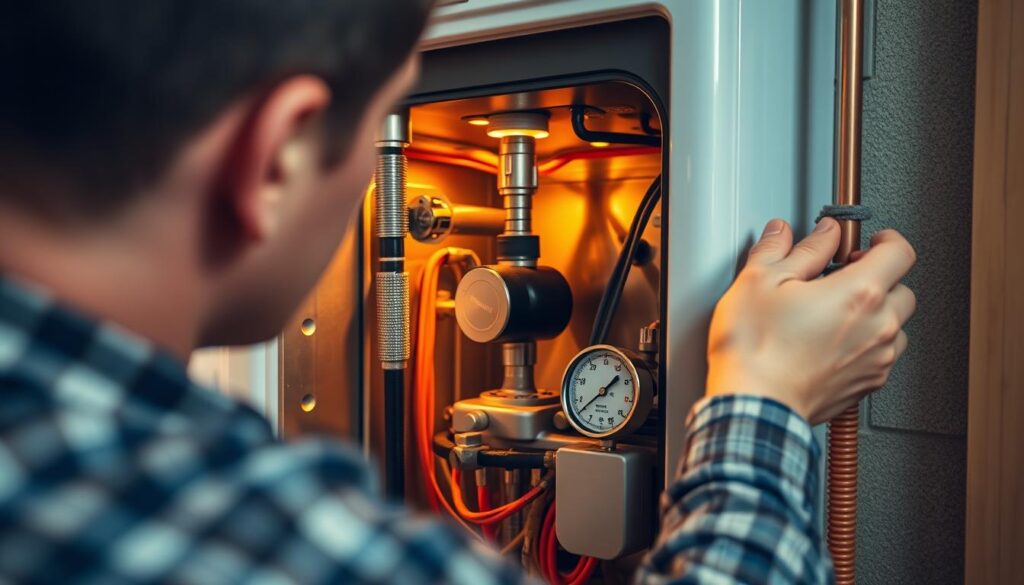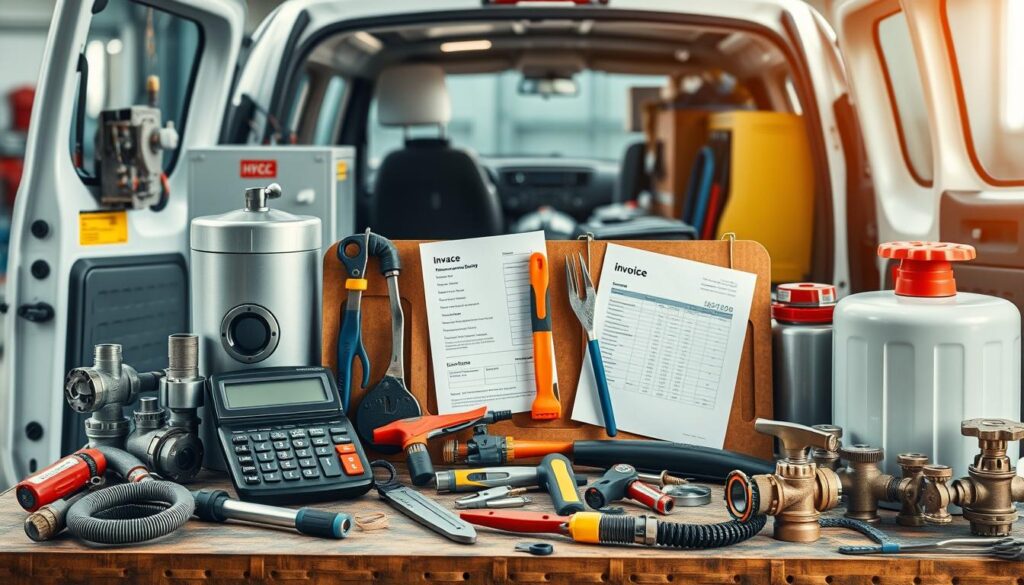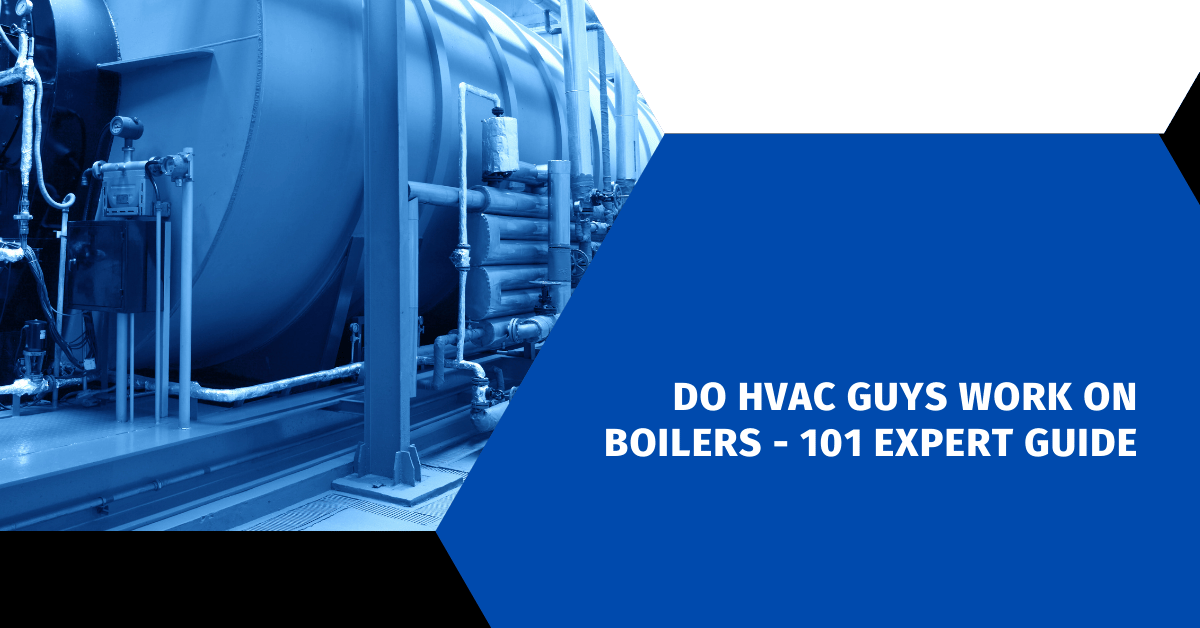Affiliate Disclosure
HVAC Guide Guys is a participant in the Amazon Services LLC Associates Program, an affiliate advertising program designed to provide a means for sites to earn advertising fees by advertising and linking to Amazon.
Do HVAC Guys Work on Boilers? “Expertise is not a monopoly; it’s a team sport.” – Mike Rowe, TV host and author
When it comes to keeping your home warm and cool, HVAC and boiler work often go hand in hand. HVAC techs are good at many heating systems. But, their skills with boilers can differ. This guide will look at how HVAC and boilers relate, the needed certifications, and what HVAC techs can do for your boiler needs.

Key Takeaways
- HVAC technicians can work on boilers, but their expertise may vary depending on their training and experience.
- HVAC pros skilled in boiler care can do tasks like pipe fixes, steam and hot water boiler setup, and furnace checks.
- HVAC techs with NATE (North American Technician Excellence) certification might be ready to work on both HVAC and boiler systems.
- HVAC techs can offer many services for boilers, like regular upkeep, fixes, and even new boiler setups.
- It’s key for HVAC techs to follow safety rules, use the right tools, and stick to local laws when working on boilers.
Table of Contents
Understanding the Relationship Between HVAC and Boiler Systems
As a homeowner, knowing how HVAC and boiler systems work together is key. Both are vital for comfort and warmth, but they differ in features and needs. HVAC techs handle many heating systems, like furnaces, boilers, and hot water heaters, each needing its own skills.
Types of Heating Systems HVAC Technicians Work With
In the U.S., most homes use central heating systems. Forced-air furnaces are the top choice, using ducts to spread warm air. But, boiler systems don’t need ducts. They use heated water in pipes for baseboard heaters or radiators.
HVAC pros are skilled in fixing furnace repair and hot water heaters. Yet, they might need extra training for complex boiler systems. These systems heat differently than forced-air furnaces.
Differentiating Between HVAC and Boiler Expertise
Some HVAC experts know both HVAC and boiler systems well. Others focus more on one. Boilers, which warm water for distribution, need special skills. HVAC techs for boilers must grasp hydronic heating, including setup, upkeep, and fixing issues.
| Feature | Furnace | Boiler |
|---|---|---|
| Heat Distribution | Forced-air through ducts | Heated water through pipes |
| Fuel Source | Gas or electricity | Gas, electricity, or oil |
| Efficiency | Varies, typically lower | Generally higher, less heat loss |
| Maintenance | More frequent, higher cost | Less frequent, lower cost |
Knowing the differences between HVAC and boiler systems helps homeowners make better choices. It ensures they hire the right experts for their heating needs.
Explore Our HVAC Shop
Looking for top-rated HVAC tools, parts, and accessories? Visit our shop and find the perfect solution for your needs.
Visit the ShopRequired Certifications and Licensing for Boiler Work
When it comes to working on boilers, HVAC techs need special training and licenses. The rules can change a lot depending on where you are. But in many places, you need a state license to legally work on boilers. Also, having a NATE Certificate (North American Technician Excellence) is key. It shows you know your stuff about heating and cooling systems.
Before you let someone work on your boiler, check their credentials. A certified pro will do the job right and safely. This means you can trust the work and feel good about it.
| State | Boiler Licensing Requirements |
|---|---|
| Michigan | Mechanical License and heating service endorsement required to service boilers. |
| Iowa | Requirements depend on city codes, with classifications like 1st and 2nd class fireman/engineer. |
| California | No license required to operate high-pressure gas boilers over 15 psi. |
| Ohio | No license needed to service or maintain boilers unless the vessel exceeds a specific size. |
In some places, you might not need a personal license if you work under a business’s license. But, the rules can really vary. So, it’s important to check what’s needed in your area.
“A competent operator must be present at all times for high-pressure gas-fired boilers over 15 psi.”
Make sure your HVAC tech has the right certifications and licenses for boiler work. This way, you can be sure the service is safe and done well. It’s all about keeping you and your property safe.
Explore Our HVAC Shop
Looking for top-rated HVAC tools, parts, and accessories? Visit our shop and find the perfect solution for your needs.
Visit the ShopDo HVAC Guys Work on Boilers: Scope of Services
HVAC (Heating, Ventilation, and Air Conditioning) technicians are key in boiler maintenance and repairs. They focus mainly on air conditioning and heating but also work on boilers. They offer a variety of services to both homes and businesses.
Common Boiler Services Offered by HVAC Technicians
HVAC technicians provide many boiler services. This includes installation, maintenance, and repairs. They help with tasks like:
- Inspecting and servicing boiler components, including the burner, heat exchanger, and safety controls
- Performing routine tune-ups and adjustments to ensure efficient and safe operation
- Diagnosing and troubleshooting boiler issues, such as pilot light problems or leaks
- Repairing or replacing faulty boiler parts, such as thermostats, valves, and pumps
- Providing guidance on energy-efficient boiler upgrades and replacements
Specialized Tools and Equipment Required
HVAC technicians use special tools and equipment for boiler work. They have combustion analyzers, flue gas analyzers, and pressure gauges. These tools help them check the boiler’s performance and find problems.
They also use tools for taking apart, fixing, and putting back together boiler parts. This ensures their work is thorough and professional.
Safety Protocols and Regulations
Boiler maintenance and repair must follow strict safety rules and local laws. HVAC technicians need to know how to handle gas lines, electrical systems, and high-pressure parts safely. They follow safety guidelines and work to keep the boiler system safe and compliant.
“HVAC technicians are essential in maintaining the safety and efficiency of boiler systems, providing a valuable service to homeowners and businesses.”
Professional Training and Expertise Requirements
To work on boilers, HVAC technicians need a lot of training and knowledge. They must understand electrical systems, plumbing, and different boiler technologies. They also need to keep learning to know about new systems and rules.
Industry data shows HVAC technician jobs will grow by 15% by 2026. They make an average of $45,910, but those with more experience can earn over $60,000. Those skilled in refrigeration can make $75,000 to $100,000.
HVAC technicians should always be learning and getting better. Those with a diploma start at $35,000 to $40,000. Those with an associate degree can start at $45,000 to $65,000. The more skills and certifications they have, the more they can earn.
The training and licenses needed for HVAC technicians vary by state. For example, in Alabama, you don’t need a license to be an HVAC Technician. But, an HVAC Contractor needs a License from the Alabama Board. In Alaska, HVAC Technicians need a Certificate and pass an exam. HVAC Contractors need a Mechanical Administrator license with certain qualifications.
Aspiring HVAC professionals must check the training, certification, and licensing needs in their state. They need to keep learning and stay current with industry changes to succeed.
“The more expertise and certifications an HVAC technician accumulates, the greater their value and earning potential in the industry.”
Explore Our HVAC Shop
Looking for top-rated HVAC tools, parts, and accessories? Visit our shop and find the perfect solution for your needs.
Visit the ShopBoiler Installation and Replacement Services
HVAC technicians are key in managing your home’s heating system. They handle boiler installation and replacement. This includes planning, installation, and following best practices.
Planning and Assessment Process
HVAC experts start by checking your current boiler. They look at its age, efficiency, and condition. They also consider your home’s size and layout to pick the right boiler size and setup.
This planning is crucial. It makes sure the new boiler fits your heating needs and follows local rules.
Installation Procedures and Best Practices
After planning, HVAC techs can start the installation. They get the needed permits to meet safety and code standards. They remove the old boiler, set up the new one, and connect it to your HVAC system.
Following best practices is important. It ensures the boiler works well and safely.
HVAC technicians are very important in this process. Their knowledge and professionalism are key. They make sure your home stays comfortable and energy-efficient.
Maintenance and Inspection Guidelines
Keeping your boiler in good shape is key for its safety and efficiency. HVAC technicians are essential in making sure your boiler works well. They do this through regular annual inspections. These checks include looking for cracks, leaks, and making sure everything is working right.
During these inspections, the technician will also do pressure checks. They also make sure there are no fire hazards around. It’s smart to schedule maintenance in the spring or summer. This is when technicians are usually easier to find.
| Maintenance Task | Frequency | Benefits |
|---|---|---|
| Boiler Inspection | Annual | Ensures safe and efficient operation, extends boiler lifespan |
| Pressure Checks | Annual | Optimizes boiler performance, identifies potential issues |
| Radiator Bleeding | Annual | Improves heating system efficiency, enhances heat distribution |
| Boiler Replacement | Every 15 years | Upgrades to newer, more energy-efficient models, reduces maintenance costs |
Regular boiler maintenance helps avoid expensive fixes and keeps your heating system running longer. By getting annual inspections and fixing problems fast, your boiler will keep your home warm and efficient.

“A well-maintained boiler is crucial for maintaining efficiency and durability, potentially extending the lifespan of the equipment.”
Explore Our HVAC Shop
Looking for top-rated HVAC tools, parts, and accessories? Visit our shop and find the perfect solution for your needs.
Visit the ShopTroubleshooting Common Boiler Problems
HVAC technicians are experts at fixing boiler issues. They can handle everything from pilot light problems to frozen pipes. They use special tools and methods to find and fix the problem quickly.
Diagnostic Procedures
HVAC techs use advanced tools to check the boiler system. They look for pilot light issues, kettling, strange sounds, low pressure, and leaks. By analyzing the system, they can find the cause and fix it.
Emergency Response Services
Boiler problems need quick fixes to avoid damage or safety risks. HVAC techs offer emergency services to quickly solve issues. They can handle everything from a complete breakdown to frozen pipes.
| Common Boiler Problems | Potential Causes | Solutions |
|---|---|---|
| Pilot light issues | Drafts, broken thermocouples | Adjust pilot light, replace thermocouple |
| Kettling (gurgling/rumbling) | Lime (calcium) buildup | Flush the system, descale the boiler |
| Abnormal sounds | Air in the system, pump failure | Bleed radiators, replace pump |
| Low pressure | Leaks, failing pressure valves | Identify and repair leaks, replace pressure valves |
| Leaking | Rusting, corrosion, broken seals and valves | Replace faulty components, seal leaks |
HVAC techs use their skills and tools to fix many boiler problems. They ensure the heating system is safe and efficient. Whether it’s a small issue or an emergency, they have the boiler repairs, emergency services, and diagnostic tools needed to fix it.
Cost Considerations and Service Rates
The cost of HVAC services for boilers can change a lot. It depends on how complex the job is, the technician’s skill level, and what services you need. All these factors affect the final cost.
Technicians who specialize in boiler repair and maintenance often charge more. This is because they have the specific knowledge and skills needed to fix boiler problems well.
The cost of an HVAC service call can be between $75 and $250 or more. More complex or urgent repairs can cost even more. Parts and materials needed for the job can add $40 to over $1,000 to the total cost.
To give you a better idea, here’s a list of common HVAC service costs:
- HVAC Technician Hourly Rates: $65 to $150 or more
- Furnace Repair: $280 on average, ranging from $60 to $880
- AC Repair: $135 to $450 per hour, with extensive repairs costing over $1,000
- HVAC Replacements: $500 to $2,500 for labor, $4,000 to $10,000 for new installations
The total cost of HVAC services for boilers can vary a lot. It depends on the job’s specific needs, location, and the technician’s expertise. Getting quotes from different HVAC companies is a good idea. This way, you can find the best and most transparent prices for your boiler services.
| Service | Average Cost | Range |
|---|---|---|
| HVAC Service Call | $150 | $75 – $250+ |
| AC Repair | $320 | $135 – $450/hr |
| AC Tune-up | $99 | – |
| Furnace Repair | $280 | $60 – $880 |
| HVAC Replacement (Labor) | $1,250 | $500 – $2,500 |
| HVAC Installation | $7,000 | $4,000 – $10,000 |

Explore Our HVAC Shop
Looking for top-rated HVAC tools, parts, and accessories? Visit our shop and find the perfect solution for your needs.
Visit the ShopSeasonal Maintenance Tips and Recommendations
As the seasons change, it’s key to keep your boiler system in great shape. HVAC experts say regular maintenance, especially before winter, is a must. This ensures your heating system is ready for the cold weather. Proper preparation can avoid breakdowns and keep your home cozy all season.
Pre-Winter Preparation
Before winter hits, get your boiler system checked. This tune-up includes several important tasks:
- Inspecting and cleaning the boiler parts
- Looking for wear or damage in the system
- Adjusting the burner for better efficiency
- Checking safety controls work right
- Swapping out any old or damaged parts, like the air filter
These pre-winter checks help keep your boiler efficient, extend its life, and save you from expensive repairs later.
Off-Season Maintenance Benefits
Don’t stop maintenance when winter ends. In fact, spring and summer servicing is just as crucial. HVAC pros suggest a second check-up during these seasons when they’re less busy.
Off-season maintenance offers many benefits:
- Spotting issues before they get big
- Boosting energy efficiency for the next heating season
- Extending your boiler’s life
- Preventing breakdowns when you need heat most
- Getting service when technicians are more available
Seasonal maintenance keeps your boiler efficient all year. It also cuts down on repair costs and emergency calls.
Conclusion
HVAC technicians can work on boilers, but they need the right certifications and skills. It’s key to get regular maintenance from experts. This keeps your boiler system safe, efficient, and lasting longer.
As a homeowner, check the qualifications of HVAC pros before hiring them. This ensures they can handle boiler-related services well. With professional maintenance, your boiler will work better all year.
Experienced HVAC technicians have many ways into the field. Some start after high school, while others come from the Navy or other careers. Knowing about HVAC and boiler skills helps you make smart choices for your systems.
Letting qualified HVAC pros take care of your boiler system keeps your space comfortable and efficient. It also helps the environment. Remember, professional maintenance is a smart investment for your heating and cooling systems.

